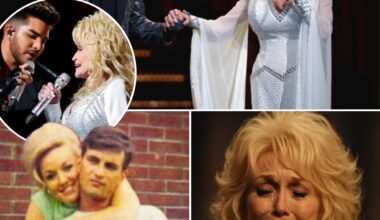
As part of the All-Star 75th Birthday Celebration, two of folk and country’s most treasured voices — Joan Baez and Emmylou Harris — came together to perform Stephen Foster’s 1854 classic “Hard Times Come Again No More.”
The night itself was a gathering of legends, celebrating the heart of American folk traditions. Yet when Baez and Harris stepped into the spotlight, the atmosphere shifted. Their voices — Baez with her crystalline, almost ethereal soprano, and Harris with her rich, earthy alto — intertwined in a way that felt timeless, breathing new life into Foster’s plea for compassion and empathy.
More than 160 years after it was written, “Hard Times Come Again No More” continues to resonate, its lyrics echoing the struggles of ordinary people and the hope for brighter days. Covered by countless artists over the decades, from Bob Dylan to James Taylor, the song has always carried a universal truth. But in the hands of Baez and Harris, it became something even more profound: a living reminder that hardship and hope walk hand in hand.
The performance began with Baez’s delicate, unwavering voice, filling the hushed theatre with quiet reverence. When Harris joined in, her harmonies wrapped around Baez’s melody like comfort itself — two distinct voices creating one seamless prayer. Accompanied only by gentle acoustic instrumentation, the simplicity of the arrangement allowed every word to cut deep.
Inside the Beacon Theatre, time seemed to stand still. The acoustics magnified every breath, every note, as the audience leaned into the moment. Some listeners closed their eyes, others wiped away tears, but all were united in a shared sense of reflection. It wasn’t just a performance — it was communion.
Fans and critics alike were quick to call it one of the evening’s defining moments. Social media lit up with praise, with one attendee writing, “Hearing Baez and Harris sing this was like touching history itself.” Another shared, “That wasn’t just music — it was a prayer for the world.”
For Baez and Harris, artists who have spent their lives using music to champion justice, peace, and human dignity, the song’s message felt deeply aligned with their legacies. And for everyone in the theatre, it was a reminder that while hard times may come, music — and the voices of those who carry it with honesty — gives us the courage to believe that better days will follow.





